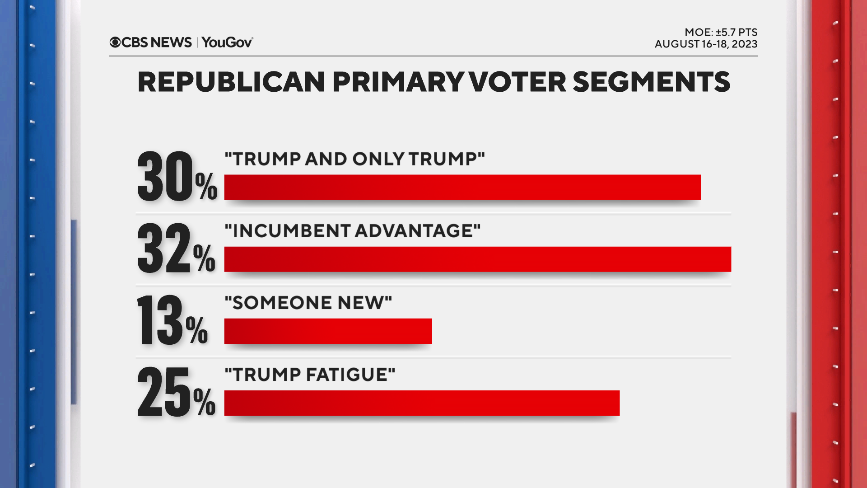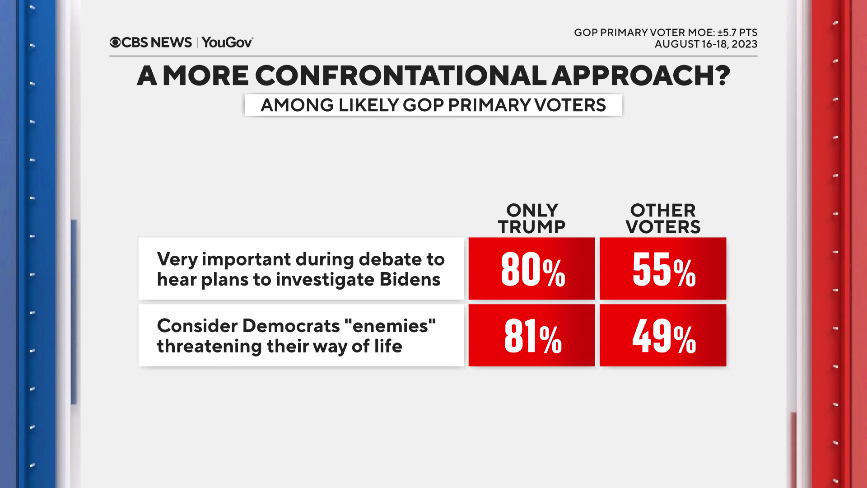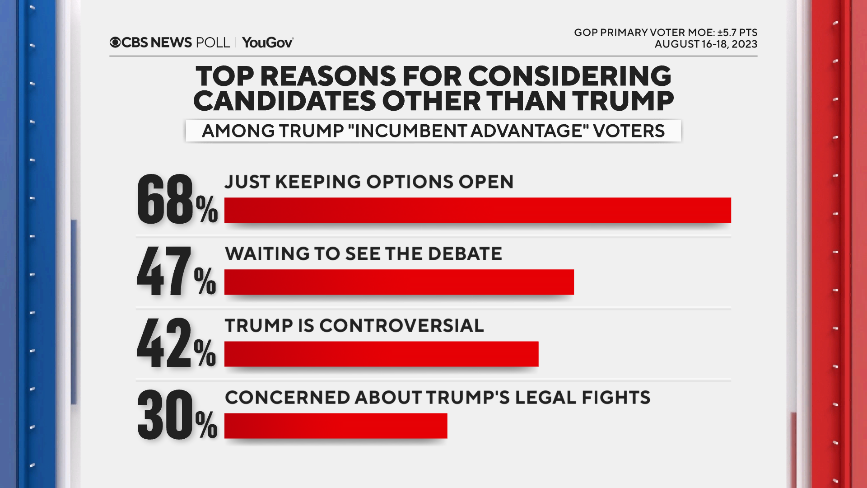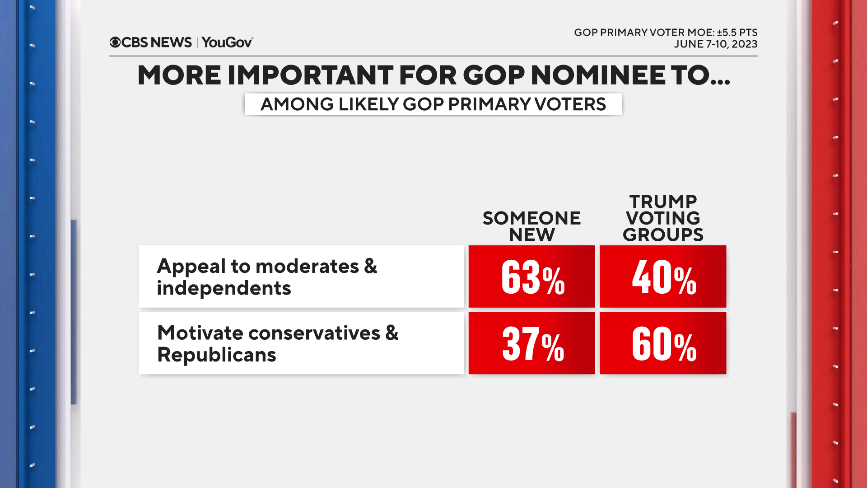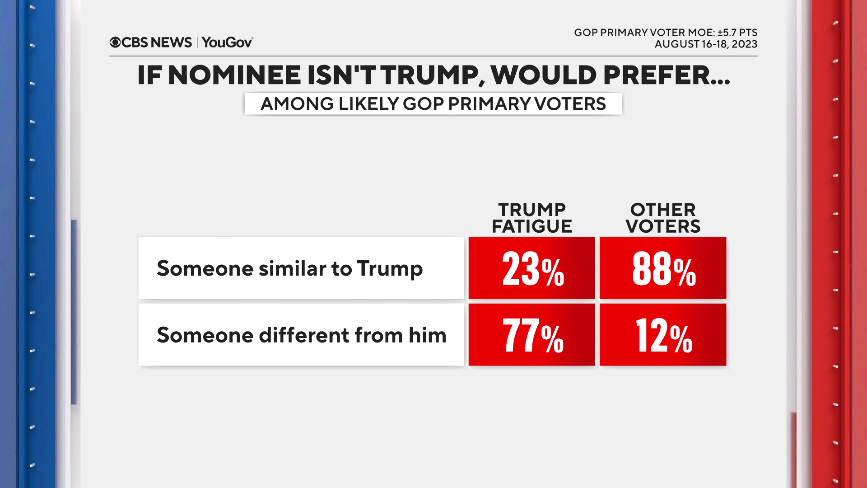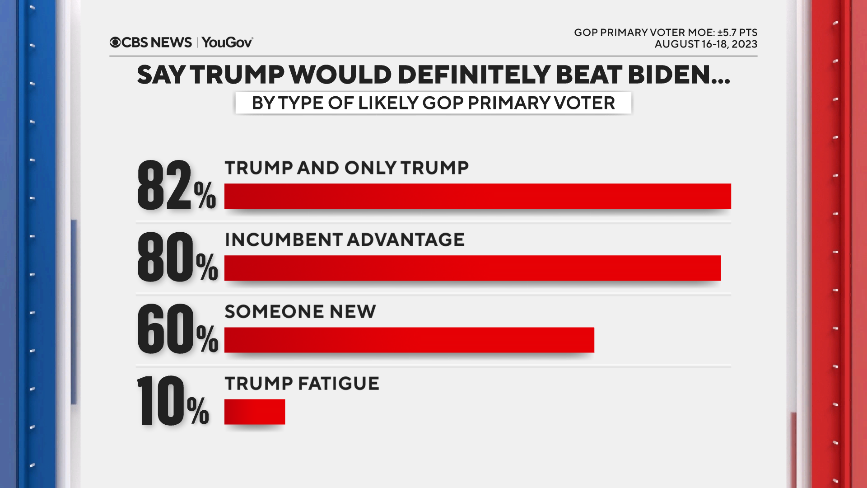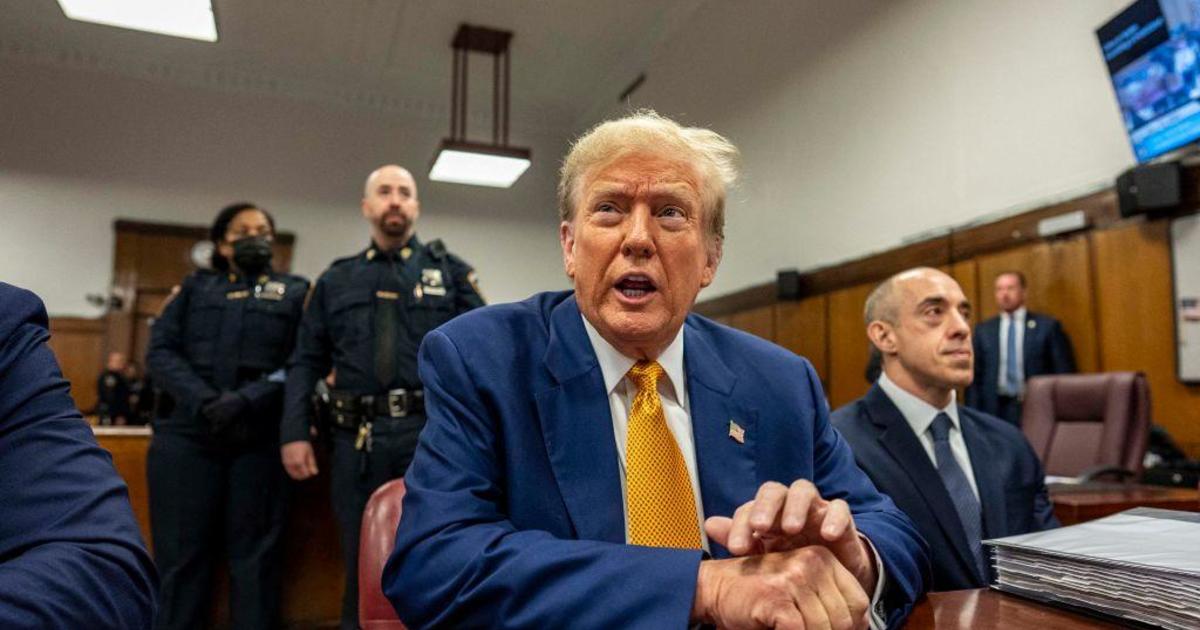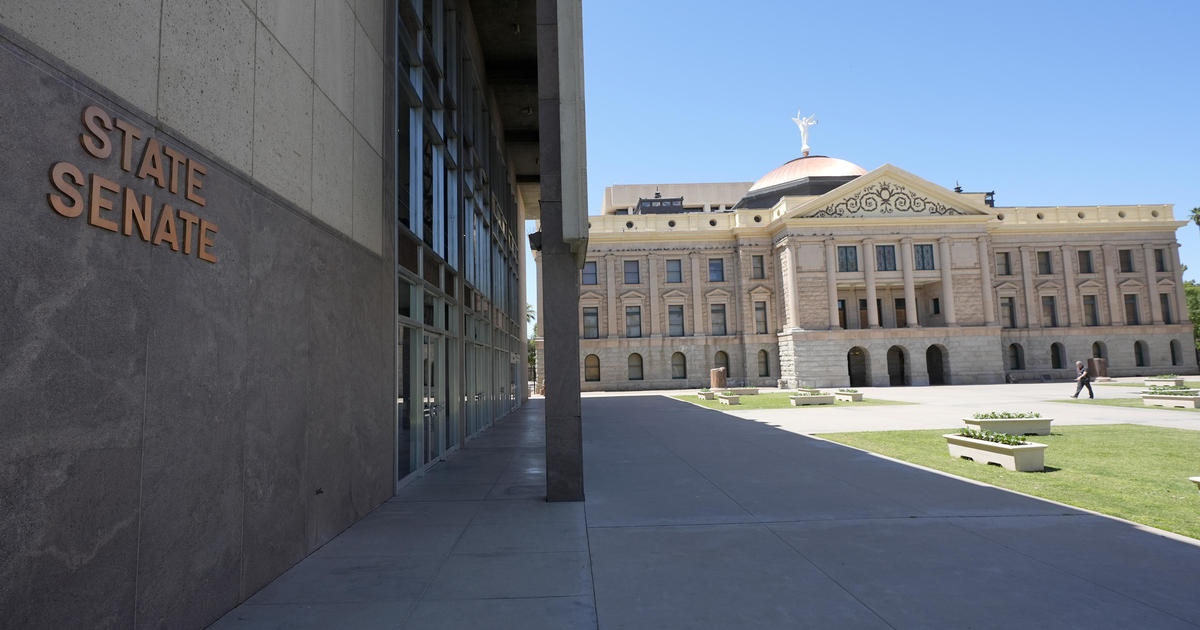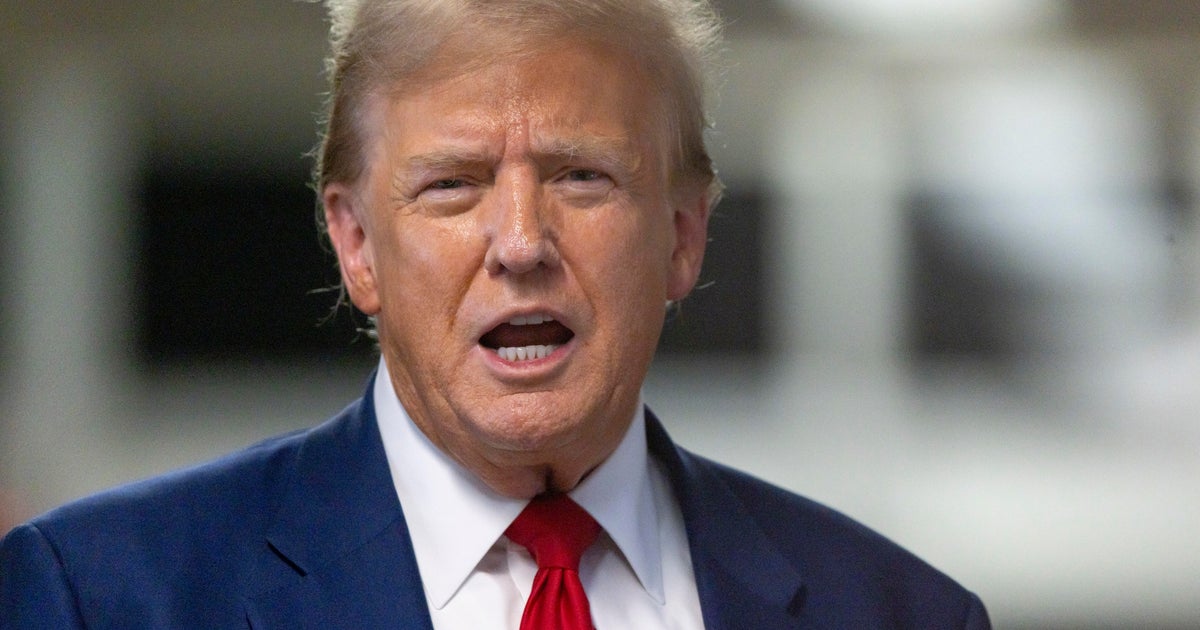First Republican debate guide: Four types of GOP primary voters, and just how solid is that Trump vote?
Editor's note: This story was prepared before Wednesday night's Republican presidential debate.
Former President Donald Trump has such a big lead in the Republican nomination contest — and is, voters tell us, such a dominant topic of the campaign — that we can even define primary voter segments around him. That helps explore just how solid his support really is.
Trump has the lion's share of the vote and he has even more people considering him — so his lead could grow.
Most Republican primary voters planning to watch the debate are at least considering other candidates. It doesn't mean they would prefer someone other than Trump, but they at least signal an openness to the possibility. The challenge for other candidates is that most voters want someone similar to Trump, while Trump himself is running.
So, here are the four groups, which we have named, based on our most recent polling and informed by our two previous waves of GOP polling this year.
"Trump-and-only-Trump" voters (30%)
Definition: Not only are these voters voting for Trump, but they're also considering only him and no other names. They aren't even giving others a look.
At three in 10 GOP primary voters and nearly half of Trump voters, they provide a "floor" of support that, by itself, might be enough to win the nomination in a crowded field, if it came to that.
They're the core of the "MAGA base." We know them well by now: we watched their impact in the midterms last year and in 2020. It's no secret how they vote. The only question is how big their ranks ultimately grow in the 2024 primaries.
What distinguishes them now?
A personal connection: they almost all say Trump "fights" for them. And they're also supporting him in his legal fights, wanting payback, more so than the larger group of those considering him. They like Trump personally and have told us he makes them feel "confident," "inspired" and "empowered".
It's combative. They overwhelmingly see Democrats as enemies and threats to their way of life more than as mere political opponents. To that end, this group is most likely to want to hear debate topics like investigating the Biden family.
They want a tough line on immigration: They would prefer a nominee who says migrants at the U.S.-Mexico border should be punished, rather than treated well, by three to one.
More broadly, their vision for America looks further back: Like many Republicans, they think the answer to today's problems lies in the past — but not the past of the 2010s, which included years Trump was president (though they do think things were better then).
Instead, it's the 1950s and the 1980s that they think provide answers for today (also, of course, two decades dominated by Republican presidents too).
Trump's "incumbent advantage" voters (32%)
Definition: They're voting Trump, but say they're also actively considering at least one other candidate.
In many ways, they look ideologically similar to the first group. Just as many identify as "very" conservative and "strong" Republicans, if not more, and they hold similar views on abortion and which groups are treated unfairly in the U.S. However, they are less likely than Trump-and-only-Trump voters to identify as part of the MAGA movement, and less motivated by ideas like payback and loyalty.
One big reason for their consideration: they've always been supporters. They know him better than others. Plus they like him personally, but even more, they believe he fights for them, suggesting again the slightly more transactional thought process. Given that, we call these factors Trump's "incumbent advantage" because while he's not technically one any more, that familiarity and continuity of support from voters are things one might see with an incumbent.
When asked why they're also considering others, though, their main reason they give is that they're just keeping options open. For these voters, it's just early. But they do not want someone new for the sake of someone new. And if it wasn't Trump, they'd want a nominee similar to him.
They're the most likely group to watch the debate and were more likely than only-Trump voters to say Trump should show up to it — perhaps reflecting that desire to see more — before he announced he would not be participating.
They're also relatively unconcerned by his legal fights and still think Trump is their best chance to beat President Joe Biden. They are only a little less driven by the Democrats-as-enemies narrative than are only-Trump voters.
The only question here for Trump is if he can take the next step and make them consider only him (or if the other candidates manage to drive them back to him).
It's probably by talking about his past achievements more than any suggestions about political payback. The approach for others is to be similar to Trump, while making a case they're more electable. The challenge, of course, is that Trump himself is running and already seen as very capable of defeating Biden.
"Someone new" voters (13%)
Definition: The smallest of the four groups, they are not voting for Trump right now, but they have not ruled him out. And they share a lot of commonalities with Trump voters. They don't dislike him. In fact, most would prefer the nominee be similar to him. And on several issues, including support for Ukraine, abortion, and Trump's indictments, they look more similar to those who are voting for Trump, and less similar to those who've ruled him out.
So what does separate them?
Concern about the general election: They're not as convinced that Trump will beat Mr. Biden in 2024. And beating Mr. Biden is really important to them, more than whether the nominee shares their issue positions. About half of them say Trump would definitely win — that's noticeably fewer than say so in the other, Trump-voting groups.
Relatedly, many of them describe Trump as controversial, but that's not disqualifying for them.
They've wanted a nominee with what they think is wider appeal. Unlike the first two groups, this type of voter told us in June that it's more important that the GOP nominee be able to appeal to moderate and independent voters than turn out the base. And they're less confident that Trump would beat Mr. Biden next year.
They do overwhelmingly think Trump has gotten too much coverage. Unlike the previous group, they think the party should consider "someone new."
They have a different general-election calculus, seeing Florida Gov. Ron DeSantis as about equally electable as Trump.
They, like other Republicans, think the Georgia charges are politically motivated. But compared to Trump voters, they're likelier to say Mr. Biden won legitimately in 2020. Again, this is a relative matter, but right now some of that effect is keeping Trump out of their first-choice box.
This is only about 1 in 8 voters at the moment — so Trump doesn't need these voters but could still win them over. The other candidates need to hold this vote, and one of them probably needs to consolidate it around them.
The "Trump Fatigue" vote (25%)
Definition: They've ruled out Trump for now, neither voting for him, nor considering him, nor might consider him.
Making up about a quarter of the electorate, they aren't numerous enough to change the race on their own.
In May, six in 10 of this type of voter said Trump makes them feel "exhausted" and one third "worried." Today, three in four aren't only looking for someone else, but they want a nominee that they would describe as different from Trump.
They don't like Trump personally and are mostly worried that he cannot win the general election. A quarter say he would be a "long shot" to beat Mr. Biden, and this group sees several candidates as more electable than him: DeSantis tops this list, followed by Scott and Haley.
They mostly voted for Trump in 2020, though with a little more crossover to Mr. Biden than other Republicans. They are largely conservative but more likely than other primary voters to label themselves moderate.
They are much more likely to hold college degrees than the rest of the primary electorate, and also tend to have higher incomes and be more suburban. They, like all Republicans, dislike the way things are going, but they're a little more likely than fellow partisans to think the answers lie in the future.
Big picture/what to watch
Looking at the race as a whole, zooming out from the segments, we can see each candidate's current support, as well as the percentage considering them. Consideration is always important at this early stage. While it signals that several candidates have room to grow, it also means there's potential for Trump's lead to grow even larger — there are additional people considering him, who aren't backing him right now.
And if the debates are to have an impact on the race, it will be important to watch Trump's softer supporters — can any candidates make the case that they are more electable than Trump? And will "Someone new" and "Trump fatigue" voters start to coalesce around an alternative if there's someone they see shine on the debate stage?
Editor's Note: A label on a graphic was edited from an earlier version to correctly match the text.
This CBS News/YouGov survey was conducted with a nationally representative sample of 2,061 U.S. adult residents interviewed between August 16-18, 2023, including 538 likely Republican primary voters. The sample was weighted according to gender, age, race, and education based on the U.S. Census American Community Survey and Current Population Survey, as well as past vote. The margin of error is ±3.0 points for the sample overall and ±5.7 points for likely Republican primary voters.
